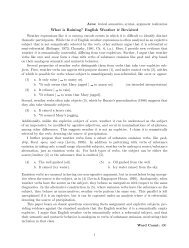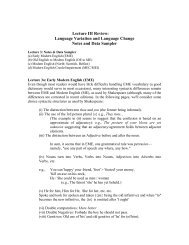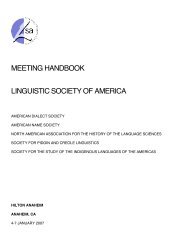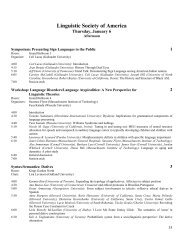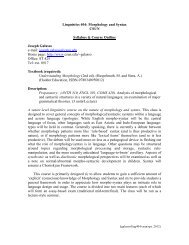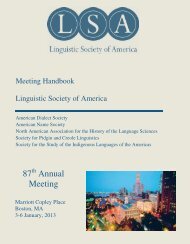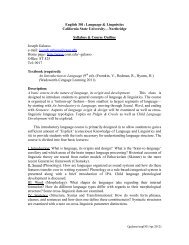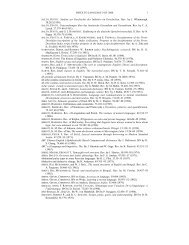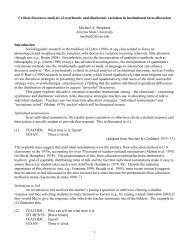here - Linguistic Society of America
here - Linguistic Society of America
here - Linguistic Society of America
You also want an ePaper? Increase the reach of your titles
YUMPU automatically turns print PDFs into web optimized ePapers that Google loves.
Peter Wilson (Nepean High School, Ottawa, ON) Session 104Prayers in Kwakwala: translation and discourseNumerous texts and concepts collected on the Pacific Northwest Coast indigenous languages have been mistranslated andmisrepresented, perhaps the most infamous being the translation and representation <strong>of</strong> the Cannibal <strong>Society</strong>. A comparisonbetween the original Kwakwala texts known as “prayers” in the works <strong>of</strong> Boas and Hunt and their English translations, as well asa comparison <strong>of</strong> the Kwakwala used in prayers published by the Anglican Church and the Kwakwala in traditional prayers,demonstrate that the translations reflect a Western European discourse, not a Kwakiutl one.Walt Wolfram (North Carolina State University) Session 58Hayley Heaton (University <strong>of</strong> Michigan)Amanda Eads (North Carolina State University)Lebanese English in the <strong>America</strong>n South: dialect accommodation and the recession <strong>of</strong> substrateA cohesive Lebanese community has existed in North Carolina for over a century, raising issues about the role <strong>of</strong> substratefeatures and the accommodation <strong>of</strong> Southern English. The acoustic analysis <strong>of</strong> vowel systems, syllable timing, and voice-onsettiming (VOT) along with the analysis <strong>of</strong> selected morphosyntactic analyses demonstrates that Lebanese born in North Carolina donot maintain substrate influence. Selected aspects <strong>of</strong> Southern vowels are accommodated, but accommodation avoids sociallystigmatized grammatical features. The pattern, which contrasts with other Southern ethnolinguistic repertoires, is explained interms <strong>of</strong> community values that underscore upward mobility and educational and social status achievement.Jim Wood (Yale University) Session 34Einar Freyr Sigurðssons (University <strong>of</strong> Pennsylvania)Get-passives as get-anticausatives: evidence from IcelandicHaegeman (1985) proposed that English get-causatives (John got Mary arrested) provide the derivational source for get-passives(Mary i got t i arrested). We present Icelandic data that supports this analysis, but only when supplemented with Alexiadou’s(2012) claim that English get-passives are ambiguous between “middles” and passives. Support for the “anticausative” analysiscomes from: (i) anticausative morphology on ‘get’ and (ii) preservation <strong>of</strong> oblique case on the derived subject (which isdiagnostic <strong>of</strong> verbal passives). Thematic restrictions on the result, however, suggest that this derivation cannot be the only sourcefor get-passives in English, supporting the view that English get-passives are ambiguous.Xuehua Xiang (University <strong>of</strong> Illinois at Chicago) Session 70The domain names <strong>of</strong> Fortune-500 corporations in the US and China: a cross-linguistic study.This study presents a comparative analysis <strong>of</strong> the domain names <strong>of</strong> Fortune-500 corporations (2011 ranking) in the US vs. China,focusing on the degree/types <strong>of</strong> correspondence between corporate names and companies domain names. The discussionillustrates that US domain names are largely semantic, alphabetic, intuitive and recognizable, maintaining existing corporatebrands as perceived by the public. Chinese domain names manifest diversification/irregularity due to a multitude <strong>of</strong> choices tomeet the Roman-alphabet bias <strong>of</strong> the technology <strong>of</strong> domain names technology. Further, geographical identifications form anessential component <strong>of</strong> Chinese domain names while such identifications are rare in the U.S. data.Charles Yang (University <strong>of</strong> Pennsylvania) Session 11Kyle Gorman (University <strong>of</strong> Pennsylvania)Jennifer Preys (University <strong>of</strong> Pennsylvania)Margaret Borowczyk (University <strong>of</strong> Pennsylvania)Productivity and paradigmatic gapsParadigmatic gaps arise when productivity fails (Halle 1973). The learning model <strong>of</strong> Yang (2005) provides a precise condition onproductivity: a rule/process applicable to N items is productive if and only if the number <strong>of</strong> exceptions does not exceed N/ln(N).The existence <strong>of</strong> gaps can be predicted entirely on numerical ground, as we illustrate with case studies <strong>of</strong> English past tense,Polish masculine genitives, Spanish third conjugation indicatives, and the celebrated Russian 1st person singular non-past (Halle1973)217



